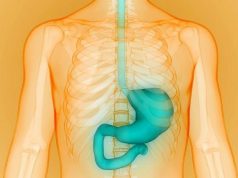Risk for acute gastroenteritis icreased for all ages combined and for those aged 45 to 64, 65 to 74, ≥75
WEDNESDAY, Nov. 27, 2019 (HealthDay News) — Continuous use of proton pump inhibitor (PPI) therapy is associated with an increased risk for acute gastroenteritis (AGE) during winter epidemic periods with peak circulation of enteric viruses, according to a study published online Nov. 27 in JAMA Network Open.
Ana-Maria Vilcu, from the Sorbonne Université in Paris, and colleagues conducted a matched cohort study using a prospectively collected drug dispensing database from a large panel of community pharmacies to examine the correlation between continuous PPI therapy and AGE occurrence during the 2015 to 2016 AGE winter epidemic. Each patient exposed to continuous PPI therapy was matched by year of birth, sex, and identifiable regular panel pharmacy to three unexposed patients; the analyses included 233,596 patients receiving PPI therapy and 626,887 matched unexposed patients.
The researchers found that at least one AGE epidemic episode was identified in 1.3 and 0.7 percent of patients receiving and not receiving PPI therapy, respectively. For those receiving PPI therapy, the adjusted relative risk for AGE was 1.81 for all ages considered, 1.66 for those aged 45 to 64 years, 2.19 for those aged 65 to 74 years, and 1.98 for those aged 75 years and older.
“The results reported in this study support the hypothesis that continuous PPI use is associated with an increased risk of infections with enteric viruses and motivate the need for further studies to confirm this association and investigate the pathophysiological mechanisms,” the authors write.
Copyright © 2019 HealthDay. All rights reserved.








